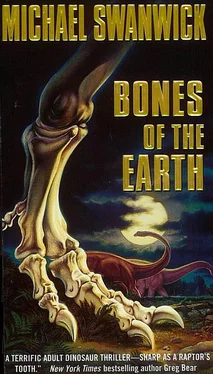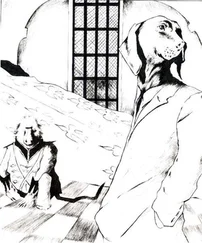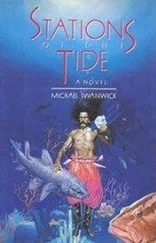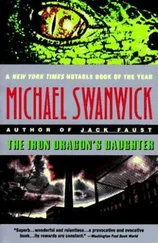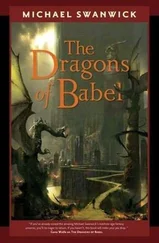“Thank you,” she said solemnly. “It’s a predator, isn’t it?”
“With those teeth? You bet. Xiphactinus is unusual in that, unlike a shark, it swallows its prey whole. The fish go down alive and struggling.”
“That doesn’t seem like a very good feeding strategy, does it? How do they keep their prey from damaging them?”
“Sometimes they don’t. Sometimes they choke on something they swallowed, and then they die. The bulldog fish is not a perfect predator. Still, enough survive to keep the species going.”
With a sudden flick of its fins, the bulldog fish was gone. The girl turned to face him for the first time.
He offered his hand. “My name’s Griffin.”
They shook. “I am pleased to meet you, Mr. Griffin. My name is Esme Borst-Campbell. Are you a paleontologist?”
“I used to be, but I got promoted. Now I’m just a bureaucratic functionary.”
“Oh,” she said, disappointedly. “I was hoping you’d be sitting at our table.”
“I’m honored that you’d want me there.” Tickets to the Ball went for a hundred thousand dollars a seat, figured at year 2010 values, and in addition to the silent auction before the meal and the dancing afterwards, those who bought an entire table for six—as the Borst-Campbells had—were given their very own paleontologist, as a sort of party favor.
“I’m just afraid that I’ll be stuck with somebody boring who’ll want to talk about dinosaurs all evening.” She managed to invest the word with an immense amount of scorn.
“You don’t like dinosaurs?”
“It’s rather a boy thing, isn’t it? Killer monsters with dagger teeth, creatures so big they could crush people underfoot. What I like about marine biology is how connected everything is. Biology and botany, vertebrates and invertebrates, chemistry and physics, behaviorism and ecology, geology and tidal mechanics—all the sciences come together in the ocean. Visibly. No matter what you’re interested in, you can study it here.”
“And what are you interested in?”
“Everything!” Esme blurted. Then, embarrassed, “I shouldn’t have said that. I’m sorry.”
“No, no, you were right to say that.” It ranked, in Griffin’s estimation, among the best things he had ever heard anybody say. “But about your problem. Let me see.” He glanced at his cheat sheet. The first item on it, printed in his own neat hand, read Esme—Richard L. “You’re in luck. You have Dr. Leyster. The two of you will get along just fine.”
“He doesn’t like dinosaurs?”
“Well, he does, but I’ll tell you what to do.”
“What?”
“When you’re introduced, look him in the eye and tell him you think dinosaur paleontology is inferior to paleoichthyology.”
“Won’t that offend him?”
“He’ll be intrigued. He’s a scientist—he’ll want to know why. And he’s a natural teacher—by the time you’re done telling him, he’ll be itching to encourage your interest. Once he’s started talking about paleomarine life, you won’t be able to shut him up.”
Skeptically, Esme said, “Will that work?”
“Trust me, I know the man.” Griffin gestured with his glass toward the distant kelp forest. “Now look out there, where the water gets murky. See where the shadows seem to be moving? Those are plesiosaurs, feeding on shrimp. Every now and then, if you watch, you’ll see one lazily loop up to the surface for air, and back down for more food.”
In companionable silence, they stared into the depths together, watching the shadows move. Eventually it was time for him to give the opening address, and Griffin sent the child back to her table. The plesiosaurs were gone by then.
* * *
Somebody handed him a microphone, and he tapped it twice for attention. He was standing before the window with a galaxy of ammonites to his back, shells flashing as they jetted swiftly by, too many to count.
“Ladies and gentlemen,” he said, “let me welcome you to the Turonian Age—the time when clams ruled the seas!” He paused for polite laughter, then continued.
“Believe it or not, despite all the wondrous creatures that surround us—the plesiosaurs, mosasaurs, and giant sharks—the primary purpose of Xanadu Station is to study the rudist clams that make up the reefs surrounding us.
“Why? Because these creatures achieved something remarkable and then mysteriously lost it. Rudist clams began as simple burrowers. But then they learned how to join together in colonies and form reefs. Their shells are corrugated with little bubbles, so it took them less time than other shellfish to lay down calcium. Because they grew fast, they quickly came to dominate the ocean ecosphere. Yet shortly before the end of the Cretaceous, for reasons we do not yet understand, they went extinct. It was only because of this that corals were later able to learn the same trick and filled the reef-building niche, where they remain into the modern age. We cannot explain why this happened. We’re here to find out.”
He paused, and flashed a sincere grin. “But that’s not to say you have to spend the evening watching clams! We have a lot of marine life scheduled for you tonight, beginning with a pair of mosasaurs that should be closing in on us right… about… now!”
The lights dimmed. Now the tables were illumined only by what sunlight found its way down through the water. Griffin lit up his microphone, swept it around to draw everyone’s eyes, and pointed it straight outward. Softly, he said, “Here they come.”
From the depths of the kelp forest, two mosasaurs swam straight toward the station. They were thirty-five feet long, demon lizard-fish with nightmare-toothed jaws and dark, sardonic eyes.
They were terrifying.
Even from the safe confines of the station, they were horrific things to see descend upon you. Diners stirred uneasily. Chairs scraped against the floor.
But the mosasaurs were safely under control. In a little room not far away, two wranglers sat, joysticks in hand, controlling the creatures. Biochip interfaces had been planted deep in the reptiles’ brains, so that the wranglers could see through their eyes and move their bodies as easily as their own. This pair were their primary herding tools, used daily, and through practice grown assured and responsive.
The mosasaurs twisted, parted, and then converged again. With startling speed, they bore down upon Xanadu and the diners within.
Griffin glanced over at the Borst-Campbell table. While her parents and their guests were intent upon the show, Esme had eyes only for Leyster. She leaned raptly into his murmured words. The paleontologist’s hands moved in a circle, describing the flat, lid-like top of a rudist clam, then fluttered underneath that lid to depict the rudist’s mantle, which formed a friendly home for complex colonies of symbiotic algae.
The mosasaurs rushed down upon the station with such reckless force that it seemed they must surely crash into the glass walls. But at the last possible instant, they parted to barrel-roll left and right, simultaneously slashing their heads in a savage (and utterly gratuitous) display of teeth. The diners gasped. Then they were gone.
Esme hadn’t even looked up.
The worst of it was that she was right. This wasn’t science, any more than stunt flying was war. It was merely the whimsical exercise of power.
“There’ll be more surprises throughout the evening,” he said. “In the meantime, enjoy your meal.”
Griffin faded back to applause, and began the round of table hopping. A joke here, a word of praise there. It’s banana oil makes the world go round.
Mostly he wanted to keep an eye on the scientists. Griffin thought of them as his problem children. He knew all their faults. This one drank too much and that one was a terrible bore. The meek-looking one was an aggressive womanizer, and the grandmotherly one swore like a sailor. They were all gaping at the lighting fixtures, clusters of museum-grade coiled clams and flaring trumpet shells polished to translucence and appointed with brass fittings. Griffin was sure they were wondering how big an expedition they could fund if they were ripped down and sold.
Читать дальше
